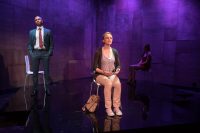
-
Award
MA Drama Directing
-
Duration
One year (full-time)
- Academic year
-
Application deadline
31 March 2024 at 4 PM
-
Applications for 2024 entry to the MA Drama Directing programme are now closed.
Course Overview
The Drama Directing MA has been specially designed to equip students with high-level skills and knowledge to work professionally as a drama director.
You will gain experience of production preparation and rehearsal techniques, including dramaturgy and collaborating with designers and other key creatives. The course will build your knowledge, skills and confidence through workshops, classes and projects. You will develop your practice of assistant directing and directing through your own workshop productions of a new script written by one of the School’s MA Drama Writing students.
There is a ‘permeable membrane’ between the Theatre School and the industry, so you will have the opportunity to learn from and work with high calibre professional practitioners as part of your training.
A key feature of the course is that it integrates with other drama disciplines. As a result, supported by experienced staff you will be working alongside writing, acting, design and technical students.
The School follows industry practice within its learning environment. You will be learning the protocols and processes involved in drama production by taking part in realised productions staged in professional theatre venues. You will be taught by School staff and experienced visiting industry professionals. The same approach is taken in the rehearsal room: you will be mentored as an assistant director by a professional director, learning within a structure that reproduces industry practice. You will learn by observation, by doing and from being steeped in the environment.
You will develop a sophisticated understanding of the process of acting and of acting methodologies and techniques, enabling you to work confidently and appropriately with actors in different styles and genres and will have experienced the technical demands of mounting a theatre production. You will also have a thorough working knowledge of working with writers, designers, lighting designers, costume makers and stage-managers.
You will graduate as a thoughtful, reflective and creative practitioner who is capable of making imaginative leaps and be an excellent collaborator, able to articulate ideas inspirationally and be sensitive to the values and creative contributions of others.
A short video to give you an idea of the course.

Career Prospects
Successful graduates will have extensive experience of working as an assistant to a range of directors and have successfully led a workshop production of a new play from inception through to completion.
You will graduate with the confidence to network and communicate using the language of the industry. You will be familiar with a range of theatre practices and have the potential to seamlessly transfer from the course to employment as a professional theatre director.
Recent MA Directing graduates have directed at Bristol Old Vic, the National Theatre, Gate Theatre, The Watermill Theatre and The Tobacco Factory.
-
Awarding Body
Bristol Old Vic Theatre School is an associate school of the University of the West of England (UWE Bristol), a Higher Education Provider registered with the Office for Students. On successful completion of this course, you will receive an award from UWE Bristol. Because of their vocational nature, BOVTS does not award degree classifications – all assessment is completed on a pass or fail basis.
-
Locations
Bristol Old Vic Theatre School – Operating on two specialist teaching sites (Downside Road, main site and Christchurch Studios). Performing in the major producing theatre venues in Bristol: Bristol Old Vic, Circomedia, Tobacco Factory, Wardrobe Theatre and Redgrave Theatre.
-
Entry Requirements
Applicants would normally be expected to have an honours degree in a related subject area and it is essential that they have proven professional experience in one or more capacities within the entertainment industry. This could be in directing fringe productions, working as a performer or in stage management.
Applicants should also have a clear understanding of theatre and individual creative ambitions.
If English is not your first language, you will need to demonstrate English language proficiency through a relevant qualification, such as the International English Language Testing System (IELTS), which can also be used to satisfy UK Visas and Immigration (UKVI) requirements. For MA Drama Directing, an overall score of 7.0 is normally required, with a minimum of 7.0 in each component of reading, writing, listening and speaking.
Initial shortlisting is based on the information you provide in your application and as part of the selection process, you may also be required to complete a short questionnaire.
Shortlisted applicants are invited to Bristol for an interview, normally with two members of the interviewing team. If successful, you may be required to attend a second-round (recall) audition.
There are no interview fees.
-
Module Map
This module map provides a list of the modules that make up your course.
All modules are compulsory, with each module worth a specified number of credits. They enable you to cover key subject knowledge while developing your own interests.
Module Name: The Director’s Toolkit (50 Credits)
Module Name: Assistant Director (50 Credits)
Optional Modules: There are no optional modules for this stage of this award.
Interim Award: There are no interim awards under this award scheme.
Module Name: Preparation for Employment for Directors (20 Credits)
Module Name: Directing Theatre (60 Credits)
Award: MA Drama Directing
Credit requirements: MA – 180 credits
Each module takes between 7 and 11 weeks each to complete.
-
Teaching and Learning
In the first term you will be learning in a group with other MA Drama Directing students exploring the different facets of the skills needed to be an effective and creative drama director. You will learn through seminars, workshops, master classes and theoretical projects in a structured teaching environment.
As you progress through the Course you will learn by observing the practice of professional directors in a live theatre setting, initially at assistant director level, under the guidance of teaching staff and / or mentors. You will then develop your own practice by taking responsibility for your own production – learning through doing. By being part of or leading a creative production team your directing skills will be developed by being immersed in the creative process. This will involve initial independent research about a production and creating a vision for the piece, through to the practical realisation of this piece of theatre by leading the whole team to the end point of performance on a stage.
By studying in a conservatoire drama school, you will be immersed in your subject and in an environment in which the School’s many different courses share a common purpose, that of teaching students professional practice for drama production. You are therefore learning alongside different groups of students or individuals with a shared focus, learning your place in the team and learning how to interact purposefully within a creative team.
As you learn the different elements involved in developing your work as a director of theatre or recorded media, your focus will be on enhancing your own skills and approach to leading a team and being the initiator of ideas. You will learn about the production process, be exposed to the work of leading practitioners and be mentored on practical staged productions. Through this you will develop your own voice and individual approach to performance.
There are normally six to eight students accepted on this course per academic year.
It is expected that students are able to work independently and develop leadership skills through the course as well as being taught through structured classes and workshops.
This is a full-time course and so students should expect to be studying Monday – Friday between 09:30 am and 5:30 pm. Average contact time per week will be 30 hours, considerably more in production week. Students should expect to undertake approximately 15 hours per week of independent study. During production periods there will also be evening and weekend work.
-
Academic and Student Support
Academic and Student Support
The School is committed to selecting, training and supporting students, regardless of ethnicity, gender, disability, age, sexual orientation or religion. Applicants are chosen solely on the basis of their talent and potential to develop the skills required for their chosen profession. The School does, however, judge applicants on their suitability for a course and their potential to successfully complete the training, as the work is rigorous and requires high levels of energy and commitment.
Student Support on the programmes at the School covers a variety of areas such as support for disabled students, academic support, student finance and health and welfare. Julia Heeley, Student Support Manager, is able to answer queries about support available for disabled applicants/students. Her email address is [email protected] and she can also be reached by telephone on 0117 980 9247.
Our Academic and Student Support services team provides help in the following areas:
Support for students with disabilities including specific learning difficulties
In our admissions process, we are committed to supporting students with disabilities. Disabled students are encouraged to disclose their support requirements so that we can endeavour to meet them during the audition or interview process and subsequent training. The School welcomes all students regardless of disability. It is our aim to provide appropriate support so that all students are able to achieve their full potential.
Students with a disability will be provided with advice and support from the Student Support Manager. If you have a disability or specific learning difficulty we recommend you contact her either prior to starting your course or during your first few weeks at the School to discuss any support requirements you may have. This may include support resulting from disabilities such as sensory impairment, learning difficulties such as dyslexia or dyspraxia or mental health difficulties.
We recognise that everyone is an individual and we will work with students to identify potential barriers to training and do what we can to remove those barriers. We will also make any necessary reasonable adjustments, to ensure that disabled students can train at the School.
Quickscan screening
We are aware that nationally there is a very high proportion of students with Specific Learning Difficulties (SpLDs) e.g. dyslexia or dyspraxia, in institutions which specialise in art, design or the performing arts. During your first week, the School encourages all students to take a short questionnaire known as QuickScan. It takes the form of an on-line, easy to navigate, questionnaire which will help to identify your learning style and specific areas of learning strengths and weaknesses. It is used in conjunction with other indicators, including student disclosure (as part of the interview and registration process), tutor feedback on practical and written work, and students expressing their concerns and any support requirements which may become apparent during their studies.
Disabled Student Allowance (DSA)
UK students with disabilities (including Specific Learning Difficulties and long-term Mental Health conditions) can apply for the Disabled Students Allowance (DSA). DSA usually provides support for students with the specialist equipment and tools necessary to support you with your studies, including software, hardware and study skills support. Unlike a student loan, DSA does not have to be repaid. However, it is rarely awarded in the form of financial support.Applications are made through Student Finance England (SFE), Student Finance Wales (SFW), or Student Awards Agency for Scotland (SAAS). In order to apply for DSA, Student Finance will require evidence of any impairment or disability. This may take the form of a doctor’s or specialist’s letter or, more often, a report from an Educational Psychologist (Diagnostic Assessment Report).
If you require a Diagnostic Assessment from an Educational Psychologist, the Student Support Manager can arrange this for you and can guide you through the process.
Personal Academic Support
Various staff members at the School can help in different ways if you need academic support. If you need help with the content of classes or assessment work, you can ask the relevant head of course, tutor or your pastoral care tutor for an appointment or you can ask the Student Support Manager to arrange a tutorial with the relevant member of staff on your behalf. If you make an appointment, you can prepare for the meeting and discuss your concerns away from class. Heads of courses, modules leaders and individual tutors can all help you with understanding aspects of your training and can offer overall guidance or advice about your programme of study.
Study skills (including reading, note-taking and presentation skills)
Study skills support is usually arranged for students who have been awarded support through Disabled Student Allowance (DSA). However, the Student Support Manager will be happy to arrange one to one study skills support for you if deemed appropriate and necessary.
Mental Health, wellbeing and counselling
BOVTS recognises the challenges faced by students entering higher education and that training in a conservatoire institution can place great demands on a student both physically and emotionally.
The School has a student therapy and counselling service, which is organised and staffed by accredited, registered psychotherapists and counsellors and is there to help with any more deep-seated personal problems on which pastoral tutors are not qualified to advise. If students wish to have an initial assessment with a therapist or counsellor, they should contact the School’s Student Support Manager. A strict professional code of confidentiality is always maintained.
Student welfare and pastoral care
We actively encourage students to develop a pro-active and positive approach to their own ‘wellness’. We are preparing professionals to enter physically and mentally challenging professions and we work to enable students to sustain a physically and mentally healthy lifestyle.
Every student is assigned a pastoral tutor who monitors their progress throughout the year in addition to having access to the Student Support Manager. All students have tutorials with their head of course, head of year or allocated pastoral care tutor in which non-teaching issues can be discussed. A confidential tutorial can be requested of any member of the full-time teaching staff on your course.
In addition, BOVTS students have access to UWE’s Student Wellbeing Service, details of which can be found on UWE Bristol’s website.
For further information on support which the School offers, please see the Guide to Student Support.
-
Teaching Staff
You will be taught by an experienced teaching team whose expertise and knowledge are closely matched to the content of the course modules.
The team includes the Head of Drama Directing Course, the Artistic Director and visiting industry professionals.
Please note: the named teaching team is correct at the time of writing but may be subject to change.
You can learn more about our staff by visiting our staff profiles.
-
Assessment
There is continuous assessment of your drama directing skills, knowledge and understanding. All modules are assessed by coursework (meaning there are no exams). You will receive extensive feedback – written and oral – from teaching staff and visiting industry professionals.
On the first module, The Director’s Toolkit, you will be assessed on two projects. The first is the Collaborative Project completed with an MA Performance Design student, involving a fifteen-minute presentation by you. The second element is a Notional Project: a forty-minute presentation to an industry panel of material in preparation for a theoretical production of a play.
On the Assistant Directing module you will be assessed on the execution of the role of an assistant director on a theatre production, film or audio drama. You will also produce a detailed self-reflective journal relating to the production and your role as assistant director.
The Directing Theatre module will be assessed from your choice of play through to its performance. Aspects of this will include artistic flair and judgement, use of the space, working with the cast and your leadership and management of the creative process. You will produce a critical reflection of the above.
For Preparation for Employment for Directors you will produce a portfolio which will include critical reflection on your production experience as an assistant or lead director, a contacts database from your research into the industry, your own self-promotion material and a personal career plan.
You are assessed on a pass or fail basis (meaning that degrees are undifferentiated).
-
Fees and Funding
MA Drama Directing
Duration: 3 Terms – 38 weeks (full-time)
Fees:
UK Tuition fees for the three term MA Drama Directing Course starting in September 2024 will be £12,000 for the whole course.
International students (non UK) tuition fees for the three term MA Drama Directing course starting in September 2024 will be £27,510 for the whole of the course.
PLEASE NOTE:
The Bristol Old Vic Theatre School has been approved for the US Federal Student Loan programme.
Further details on options for funding and loans for US students studying in the UK can be found on the BOVTS US Students funding page
(Full-time route only)
It is not possible to confirm fees for future academic years, as these are dependent on Teaching Excellence Framework outcomes, but the maximum increase in each year will not exceed the rate of inflation, as measured by the Consumer Price Index (CPI).
Accommodation and living costs not included in the fees.
Increasingly much of the information and some of the content of the course is available via the School’s Virtual Learning Environment and so you will benefit from having access to your own personal computer and the internet to make the most of your course. It is estimated that a suitable personal computer will cost £300.00. See the Course Summary document for more details.
Info and advice regarding potential accommodation and living costs can be found in the General Student Information Handbook.
Sources of financial support
Details on funding options can be obtained from our Student Fees home page available here.
Bursaries, scholarships and prizes
Please see the BOVTS Fees and Financial Support page for details of Bursaries and Scholarships.
The University also provides a number of scholarships and prizes for undergraduate students, which you may be eligible to apply for. Some of these are available to students on any course (such as the Hardship Fund and bursaries offered by charitable trusts).
-
Students requiring a visa to study in the UK
Due to a recent change in the Theatre School’s governance, our Higher Education provider UWE Bristol is unable to issue Confirmation of Acceptance for Studies (CAS) documentation for BOVTS courses. Regrettably we are therefore unable to consider applications from students requiring a visa to study in the UK for 2024 entry.
The Theatre School is able to consider applications from international students who do not require a visa to study in the UK. If you are unsure of your tuition fee status, please consult the UK Council for International Student Affairs guidelines or contact our admissions office for further guidance. Prospective international students for entry in 2025 or beyond are encouraged to join our mailing list to learn more about training at Bristol Old Vic Theatre School.
-
How to Apply
How to apply
All applications for degree courses at BOVTS are made directly to the School. Please note that the School no longer uses the UCAS system.
Application for 2024 entry will close on 29 February 2024 at 16:00 GMT.
You should submit your application before 28 February 2024. If you apply after 28 February, we can’t guarantee there will still be places on your course.
Applying as an international student and Visa requirements
The application process for international students is the same as it is for everyone else.
As well as meeting our course entry requirements, you may have to provide proof of your level of English. This is because you need to meet the Home Office required standards to get a Student Route Visa to enter the country for study.
You can find out about Student Route Visa from the UK Government.
Applying after a break in studying
The application process is the same as it is for everyone else. You will have the option within your personal statement to explain why you have chosen to return to study now and how you feel you will benefit.
We accept a variety of qualifications, including the Access to HE Diploma and Open University credits. View our course pages to find out about entry requirements for each course. If you are a mature student and you have any questions about our entry requirements or your qualifications email [email protected]
Equal opportunities
The School is committed to the promotion of equal opportunities for all. We consider each application on the basis of the applicant’s suitability for the proposed programme of study, at the same time acknowledging the statutory and professional requirements of some programmes. We are keen to encourage applicants from a wide range of academic and social backgrounds to take up the opportunity of studying at the School. We aim to create an environment that respects the diversity of students and enables them to derive maximum benefit and enjoyment from their involvement in the life of the School. To do this we will be proactive about ensuring people are treated fairly regardless of age, disability, race, nationality, ethnicity, gender, religion or sexual orientation.
Application enquiries
The Admissions Office deals with enquiries and applications for all degree courses.
Telephone: +44 (0)117 9733535
Email : [email protected]
Post: Admissions Office, Bristol Old Vic Theatre School, 1-2 Downside Road, Bristol BS8 2XF, UK
Application regulations
We will only accept one application per applicant, per year. You cannot apply for more than one course. If you need further advice about choosing a course, please contact the Admissions Office.
- Policies and Procedures












